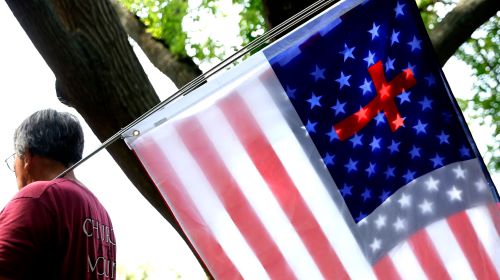

They believe opponents are evil — possibly demonic — and should be confronted with violence.

By Russell Contreras
Justice and Race Reporter
Axios
A new Louisiana law requiring the Ten Commandments to be posted in classrooms is drawing new scrutiny to Christian nationalism, a once-fringe movement steadily gaining political power in the U.S.
Why it matters: Christian nationalism seeks to establish a country governed by a fundamentalist interpretation of the Bible. Adherents and allies of the movement have aligned themselves with Donald Trump and the Republican Party.
Zoom in: The “Appeal to Heaven” flag flown outside Supreme Court Justice Samuel Alito’s home last summer — originally a Revolutionary War symbol — is linked to Christian nationalism.
- So, too, is the Alabama Supreme Court ruling in February that defined frozen embryos as children — temporarily causing IVF clinics in the state to halt treatments.
- Alabama Supreme Court Chief Justice Tom Parker cited the Bible in his legal opinion and declared on a Christian podcast that “God created government.”
State of play: Key figures in the Republican Party have openly espoused Christian nationalist beliefs once dismissed outside the mainstream, challenging long-held ideas about the separation of church and state.
- Trump’s former budget director Russ Vought, a potential candidate for chief of staff, has led efforts to infuse Christian nationalist ideas into planning for a second Trump administration, according to Politico.
- House Speaker Mike Johnson (R-La.), who displays the “Appeal to Heaven” flag outside his office, has called the separation of church and state “a misnomer.”
- Rep. Marjorie Taylor Greene (R-Ga.) has referred to herself as a “proud Christian nationalist.”


